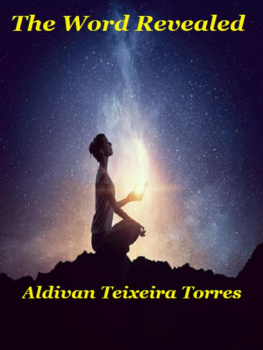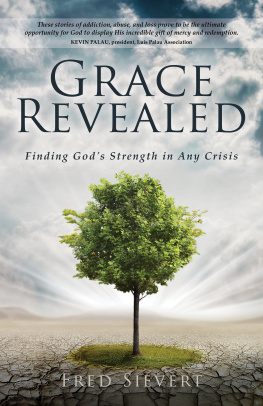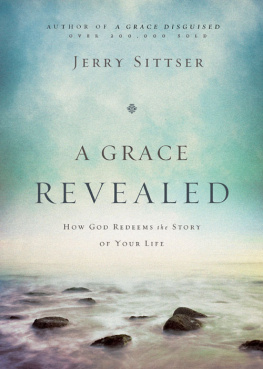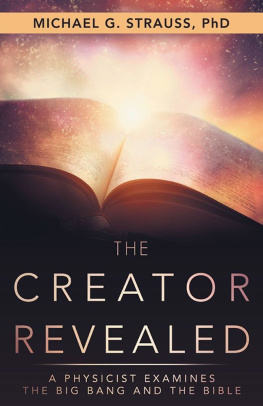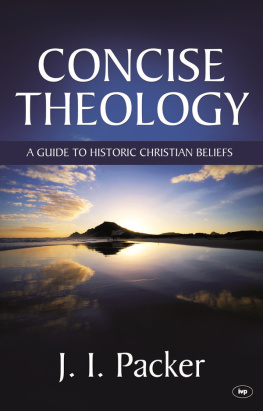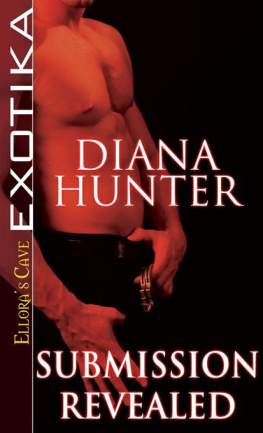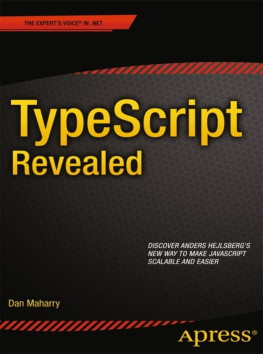Packer - Concise theology: a guide to historic Christian beliefs
Here you can read online Packer - Concise theology: a guide to historic Christian beliefs full text of the book (entire story) in english for free. Download pdf and epub, get meaning, cover and reviews about this ebook. City: Carol Stream;Ill, year: 2001, publisher: Tyndale House Publishers, Inc., genre: Religion. Description of the work, (preface) as well as reviews are available. Best literature library LitArk.com created for fans of good reading and offers a wide selection of genres:
Romance novel
Science fiction
Adventure
Detective
Science
History
Home and family
Prose
Art
Politics
Computer
Non-fiction
Religion
Business
Children
Humor
Choose a favorite category and find really read worthwhile books. Enjoy immersion in the world of imagination, feel the emotions of the characters or learn something new for yourself, make an fascinating discovery.

- Book:Concise theology: a guide to historic Christian beliefs
- Author:
- Publisher:Tyndale House Publishers, Inc.
- Genre:
- Year:2001
- City:Carol Stream;Ill
- Rating:4 / 5
- Favourites:Add to favourites
- Your mark:
- 80
- 1
- 2
- 3
- 4
- 5
Concise theology: a guide to historic Christian beliefs: summary, description and annotation
We offer to read an annotation, description, summary or preface (depends on what the author of the book "Concise theology: a guide to historic Christian beliefs" wrote himself). If you haven't found the necessary information about the book — write in the comments, we will try to find it.
Packer: author's other books
Who wrote Concise theology: a guide to historic Christian beliefs? Find out the surname, the name of the author of the book and a list of all author's works by series.
Concise theology: a guide to historic Christian beliefs — read online for free the complete book (whole text) full work
Below is the text of the book, divided by pages. System saving the place of the last page read, allows you to conveniently read the book "Concise theology: a guide to historic Christian beliefs" online for free, without having to search again every time where you left off. Put a bookmark, and you can go to the page where you finished reading at any time.
Font size:
Interval:
Bookmark:


Visit Tyndales exciting Web site at www.tyndale.com
TYNDALE and Tyndales quill logo are registered trademarks of Tyndale House Publishers, Inc.
Concise Theology
Copyright 1993 by Foundation for Reformation. All rights reserved.
The chapters in Concise Theology were originally written as extended notes for the New Geneva Study Bible, a project of the Foundation for Reformation, 400 East South Street, Suite 301, Orlando, Florida 32801.
Unless otherwise indicated, all Scripture quotations are taken from the Holy Bible, New International Version. NIV. Copyright 1973, 1978, 1984 by International Bible Society. Used by permission of Zondervan. All rights reserved.
Scripture quotations marked NRSV are from the New Revised Standard Version of the Bible, copyrighted, 1989 by the Division of Christian Education of the National Council of the Churches of Christ in the United States of America, and are used by permission. All rights reserved.
Library of Congress Cataloging-in-Publication Data
Packer, J. I. (James Innell)
Concise theology : a guide to historic Christian beliefs / J. I. Packer
p. cm.
ISBN-13: 978-0-8423-3960-5 (SC)
ISBN-10: 0-8423-3960-4 (SC)
1. Theology, Doctrinal Introductions. I. Title.
BT65.P33 1993
230.044 dc20 92-37771
ISBN 978-1-4143-2796-9 (ePub); ISBN 978-1-4143-2718-1 (Kindle); ISBN 978-1-4143-6241-0 (Apple)
Build: 2013-06-20 15:39:11
T HIS BOOK SETS OUT IN SHORT COMPASS what seem to me to be the permanent essentials of Christianity, viewed as both a belief system and a way of life. Others have other ideas of how Christianity should be profiled, but this is mine. It is Reformational and evangelical, and as such, so I maintain, historic and classic mainstream.
These briefings, which were first planned for a study Bible and have now been revised, have an intentionally scriptural cast and, like other of my writings, are peppered with texts to look up. I submit that this is how it should be, for it is basic to Christianity to receive biblical teaching as Gods own instruction, proceeding, as Calvin put it, via human agency from Gods holy mouth. If Scripture is indeed God himself preaching and teaching, as the great body of the church has always held, then the first mark of good theology is that it seeks to echo the divine Word as faithfully as it can.
Theology is first the activity of thinking and speaking about God (theologizing), and second the product of that activity (Luthers theology, or Wesleys, or Finneys, or Wimbers, or Packers, or whoevers). As an activity, theology is a cats cradle of interrelated though distinct disciplines: elucidating texts (exegesis), synthesizing what they say on the things they deal with (biblical theology), seeing how the faith was stated in the past (historical theology), formulating it for today (systematic theology), finding its implications for conduct (ethics), commending and defending it as truth and wisdom (apologetics), defining the Christian task in the world (missiology), stockpiling resources for life in Christ (spirituality) and corporate worship (liturgy), and exploring ministry (practical theology). The following chapters, sketchy as they are, range into all these areas.
Remembering that the Lord Jesus Christ called those he wanted fed sheep rather than giraffes, I have aimed to keep things as simple as possible. Archbishop William Temple was once told that he had made a complex issue very simple; he was hugely delighted, and said at once: Lord, who made me simple, make me simpler yet. My heart goes with Temples, and I have tried to keep my head in line with it.
As I often tell my students, theology is for doxology and devotion that is, the praise of God and the practice of godliness. It should therefore be presented in a way that brings awareness of the divine presence. Theology is at its healthiest when it is consciously under the eye of the God of whom it speaks, and when it is singing to his glory. This, too, I have tried to bear in mind.
These short studies of great subjects feel to me, now that I have done them, rather like the lightning tours of England that enterprising bus companies run for American visitors (fifteen minutes at Stonehenge, two hours in Oxford, theatre and overnight in Stratford, an hour and a half in York, an afternoon in the Lake District phew!). Each chapter is a mere sketchy note. Yet I dare to hope that my compressed material, Packer-packed as it is, might expand in readers minds to lift their hearts Godward, in the way that a different form of hot air lifts balloons and their passengers skyward. We shall see.
My frequent quoting of the Westminster Confession may raise some eyebrows, since I am an Anglican and not a Presbyterian. But since the Confession was intended to amplify the Thirty-nine Articles, and most of its framers were Anglican clergy, and since it is something of a masterpiece, the ripest fruit of Reformation creed-making as B. B. Warfield called it, I think I am entitled to value it as part of my Reformed Anglican heritage, and to use it as a major resource.
I gratefully acknowledge the hidden hand of my much-admired friend R. C. Sproul, from whom came the germ idea for several of these outlines. Though our styles differ, we think very much alike, and have cooperated happily in a number of projects. I find that we are sometimes referred to as the Reformed Mafia, but hard words break no bones, and on we go.
Thanks are also due to Wendell Hawley, my publisher, and LaVonne Neff, my editor, for helpfulness and patience in many forms. To work with them has been a privilege and a pleasure.
J. I. PACKER



The tablets were the work of God; the writing was the writing of God, engraved on the tablets.
EXODUS 32:16
 Christianity is the true worship and service of the true God, humankinds Creator and Redeemer. It is a religion that rests on revelation: nobody would know the truth about God, or be able to relate to him in a personal way, had not God first acted to make himself known. But God has so acted, and the sixty-six books of the Bible, thirty-nine written before Christ came and twenty-seven after, are together the record, interpretation, expression, and embodiment of his self-disclosure. God and godliness are the Bibles uniting themes.
Christianity is the true worship and service of the true God, humankinds Creator and Redeemer. It is a religion that rests on revelation: nobody would know the truth about God, or be able to relate to him in a personal way, had not God first acted to make himself known. But God has so acted, and the sixty-six books of the Bible, thirty-nine written before Christ came and twenty-seven after, are together the record, interpretation, expression, and embodiment of his self-disclosure. God and godliness are the Bibles uniting themes.
From one standpoint, the Scriptures (Scriptures means writings) are the faithful testimony of the godly to the God whom they loved and served; from another standpoint, through a unique exercise of divine overruling in their composition, they are Gods own testimony and teaching in human form. The church calls these writings the Word of God because their authorship and contents are both divine.
Decisive assurance that Scripture is from God and consists entirely of his wisdom and truth comes from Jesus Christ and his apostles, who taught in his name. Jesus, God incarnate, viewed his Bible (our Old Testament) as his heavenly Fathers written instruction, which he no less than others must obey (Matt. 4:4, 7, 10; 5:19-20; 19:4-6; 26:31, 52-54; Luke 4:16-21; 16:17; 18:31-33; 22:37; 24:25-27, 45-47; John 10:35), and which he had come to fulfill (Matt. 5:17-18; 26:24; John 5:46). Paul described the Old Testament as entirely God-breathed that is, a product of Gods Spirit (breath) just as the cosmos is (Ps. 33:6; Gen. 1:2) and written to teach Christianity (2 Tim. 3:15-17; Rom. 15:4; 1 Cor. 10:11). Peter affirms the divine origin of biblical teaching in 2 Peter 1:21 and 1 Peter 1:10-12, and so also by his manner of quoting does the writer to the Hebrews (Heb. 1:5-13; 3:7; 4:3; 10:5-7, 15-17; cf. Acts 4:25; 28:25-27).
Font size:
Interval:
Bookmark:
Similar books «Concise theology: a guide to historic Christian beliefs»
Look at similar books to Concise theology: a guide to historic Christian beliefs. We have selected literature similar in name and meaning in the hope of providing readers with more options to find new, interesting, not yet read works.
Discussion, reviews of the book Concise theology: a guide to historic Christian beliefs and just readers' own opinions. Leave your comments, write what you think about the work, its meaning or the main characters. Specify what exactly you liked and what you didn't like, and why you think so.


